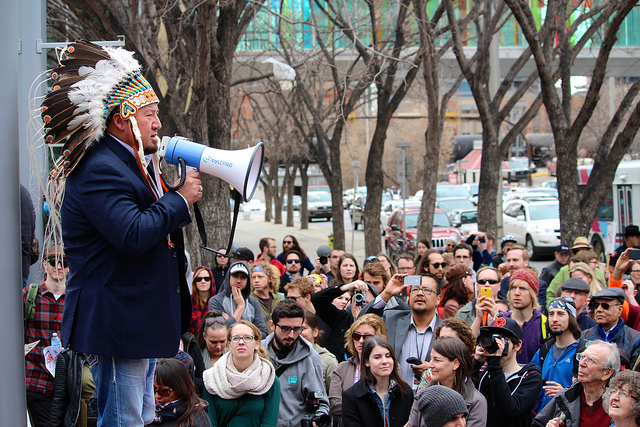Chip in to keep stories like these coming.
Assembly of First Nations (AFN) Chief Perry Bellegarde, among other chiefs and Indigenous leaders, is urging all First Nation community members to vote in the upcoming federal election.
The focus is on spreading awareness and political literacy.
There seems to be a desire to remove the Harper Conservatives from office but the AFN’s offical position is neutrality.
Derek Nepinak, the Grand Chief of the Assembly of Manitoba Chiefs, told a crowd of supporters at the annual AFN meeting in July that every Indigenous leader has a responsibility to return to their community and ensure their youth are registered to cast a ballot on October 19, 2015.
“We all have the ability to cast a ballot to effect change in Ottawa,” he is quoted as saying in The Globe and Mail last month. “We can mitigate the damages by voting for a different government in this upcoming election.”
There are 51 ridings where First Nations, Metis and Inuit communities that can cast the deciding vote.
Despite the AFN’s official policy of neutrality, many Native leaders urge strategic voting, regardless of whether it’s Liberal or NDP. It’s an ABC policy: Anything But Conservative.
One of the main issues is that statistically these communities don’t traditionally come out to vote. According to 2011 statistics, forty-five per cent of people on reserves votes, though others say that in reality the turn out was much lower. This statistic does not reflect the huge percent of Indigenous persons who don’t live on reserves.
The Conservative benefit from a lower Native turnout since many are either distrustful of the federal government or openly hostile to the Harper government’s unwillingness to call a national inquiry into murdered and missing Indigenous women or the government’s current environmental policy.
There is also a question of sovereignty and nationhood. Some First Nations communities don’t vote in the federal government since they feel they already have a band government in their lives.
To combat the lower voter turnout, Elections Canada has budgeted up to $1 million to help First Nations come to terms with the First Elections Act and the new voter-identification rules that could make it harder for Indigenous people to cast ballots in this federal election.
The former vouching system that used to exist on reserves has been abolished; which could cause strife within the 634 bands in Canada. The Fair Elections Act — which came into effect last year — installed a new procedure called “attestation” which makes it more difficult and complicated for a second voter to declare that a prospective voter resides in a riding.
For example, on some reserves, dwellings don’t have street addresses, or if a person is living on the streets of a major Canadian city, they have “no fixed address.”
Chip in to keep stories like these coming.
Note: an earlier version of this blog stated First Nations voters were being urged to vote against Harper. The AFN is encouraging voting, without advocating any particular party.
Image: Flickr/JMacPherson



